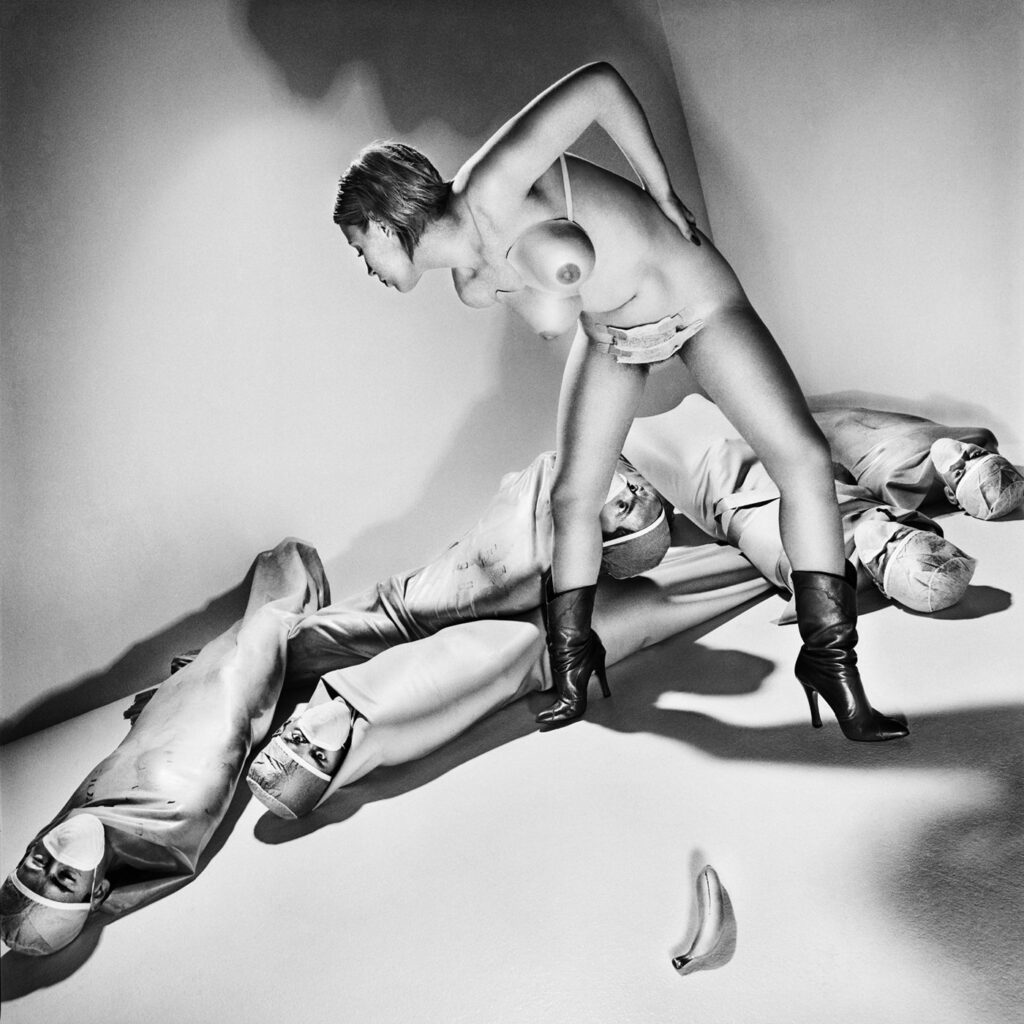Despite Devo’s reputation as an 80s band, the decade was not exactly kind to them. After the freak success of ‘Whip It’, one of America’s finest New Wave acts started to turn stale. Warner Bros. demanded another hit, and Devo did not respond well – first they took away the guitars, then the drums, and soon they found themselves doing songs for movies like Revenge Of The Nerds 2: Nerds In Paradise. Things were so dire for them that the greatest Devo song post-1983 was, in fact, written by "Weird Al" Yankovic. The de-evolution band had itself de-evolved. Perhaps this is why the original 1990 pressings of the two volumes of Hardcore Devo were limited; Devo was just not selling anymore. But Hardcore had almost nothing to do with what Devo had become in the 80s. You see, there was a time when they were one of the most unique, brilliant and downright bizarre bands around. There was a time when Devo actually irritated people on purpose, through 30-minute versions of ‘Jocko Homo’ that ended with fistfights, or through impenetrable videos where women got spanked by men in monkey masks with ping-pong paddles that bore the likeness of Chairman Mao. There was a time when the band would look at the image of a confused, smiling Chi-Chi Rodríguez on a golf strap and think, "that’s our album cover". As my father (who is also from Akron, Ohio) once put it: "Everybody was a little weird back then".
Now packaged as a set, Superior Viaduct’s reissue of Hardcore Devo, Vol. 1 & 2 is long overdue. Consisting of recordings from 1974 to 1977, Hardcore is Devo at their ugliest, but also at their most fascinating. Unlike most similar collections, a big percentage of the material here never appeared on an actual Devo release. The majority of this is just too weird to appear on a major label – this resembles the Residents’ Duck Stab more than New Traditionalists. Far from the punkish, nervous energy that characterised their first releases, Hardcore Devo is the sound of things coming apart – guitars overdriven to hell, tortured synthesisers, frightening vocoders and electronic drums that seem to be running on low battery. The economical hookiness of something like ‘Snowball’ is rare. And then you’ve got the lyrics; there are songs about sexual dysfunction, songs about army prostitutes, songs about contracting diseases, songs about not having sex at all and songs that make you want to vomit (‘Midget’, ‘I’ve Been Refused’). Scott Walker would be proud.
The first volume is probably the one that Devo fans will feel more at home with, not only because it has early versions of some of their first hits, but also because the songs resemble the kind of stuff that made Devo’s early albums. The bluesy ‘I’m A Potato’ forcefully rumbles along, while ‘Uglatto’ uses the same sort of off-balance start-and-stop rhythm that many of the songs on Q: Are We Not Men? had. But there’s also a rough quality to this, which adds an unpredictable atmosphere to otherwise straightforward songs like ‘Auto Modown/Space Girl Blues’, as though they could fall apart at any moment. It allows ‘Golden Energy’ to overload on its mutated synth riff, giving it a desolate and uneasy feel. Half-songs like ‘Buttered Beauties’ (or "that one with the incessant honking") and the disco write-off ‘Midget’ are exactly the kind of thing that (rightfully) gets left on the cutting room floor, but you’ll be glad they’re here.
The second volume is much more bizarre (or "de-evolved") – not only in the sounds (‘Booji Boy’s Funeral’ sounds like it’s being played on a malfunctioning synthesiser), but also the lyrics, which are some of the grossest and most gynophobic in the band’s history. ‘I Need A Chick’ speaks for itself, but paying close attention to ‘I’ve Been Refused’ or ‘Bamboo Bimbo’ is a surefire way to get skeeved out. The music itself is often fascinating – the rumbling blues jam ‘A Plan For U’ quacks all over the place, but winds up one of the most addictive tracks in their entire catalogue. ‘U Got Me Bugged’ and ‘Chango’ are unclassifiable collages of distortion and terrifying electronic industrial noise. This re-release adds four more tracks with dubious sound quality, but if nothing else, the concept behind ‘Doghouse Doghouse’ is so half-baked that even the band can’t keep it together.
Suffice to say, Devo would clean up a bit. Much of this was due to the addition of a new drummer, the now sadly deceased Alan Myers. He arrived late into these sessions and is credited here, though Jerry Casale would admit that in those days they used to have to tie one arm behind his back to get the sound they wanted. When he was unleashed, Devo transformed into one of the tightest and most energetic New Wave outfits that ever existed, replacing a lot of the sonic experimentation with an impeccable sense of rhythmic syncopation. By the time of Freedom Of Choice, this material was largely forgotten, and there was little indication that at one point, they were one of the strangest and most subversive bands on the planet. While Devo’s first three studio albums are pretty much unimpeachable, it’s safe to say that you won’t know what the band was really about until you’ve heard Hardcore.


